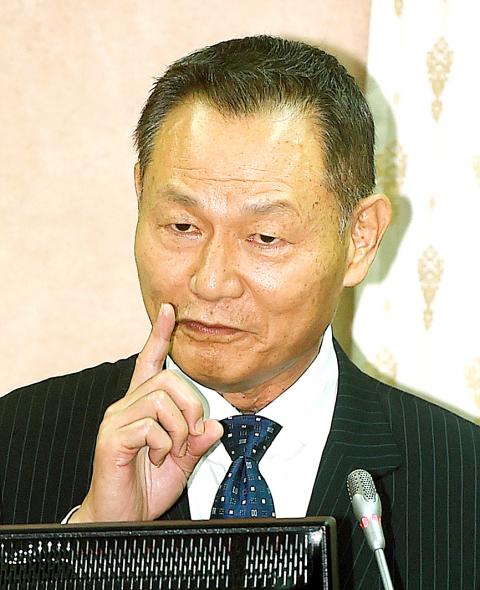Singapore has reportedly denied entry to Veterans Affairs Council Director Lee Shying-jow (李翔宙), who was on his way to visit veterans of the Republic of China (ROC) armed forces residing in Singapore, despite a tacit agreement that the visit had been approved, a media report said.
Representative to Singapore Liang Kuo-hsing (梁國興) could not be reached on his cellphone yesterday for comment.
Council officials did not deny the report, but they refused to comment on it.

Photo: Fang Pin-chao, Taipei Times
Lee, who was on his way to Thailand, had planned the stopover with the tacit approval of the Singaporean government, the report said.
Last month, Hong Kong customs authorities seized armored vehicles belonging to Singapore’s military that arrived in the territory on their way back from Taiwan after a training exercise permitted by a defense agreement with Taiwan.
The report of Lee’s denied entry and the Hong Kong incident have prompted concern that Beijing is pressuring Singapore over its ties with Taiwan.
Sources said Lee’s high status — he once served as deputy minister of national defense, a commander of the ROC Army, director-general of the National Security Bureau and as a senior presidential adviser — might have prompted concern from Singapore or Beijing.
Lee’s visit to Singapore was arranged after he was invited to attend a semi-official event in Thailand by the Thai royal family’s agricultural foundation at the end of this month.
Lee said it was appropriate that he should visit Singapore on his way to Thailand, an unnamed official at the Veterans Affairs Council told online outlet Up Media.
Another purpose of Lee’s visit to Thailand was to pay respects to the family of Sung Ching-yun (宋慶雲), a Taiwanese agricultural expert working in the kingdom who recently died there, Up Media quoted the official as saying.
The official said the council frequently assisted diplomatic efforts in the US by interacting with retired US military personnel, many of whom remained influential in military and intelligence circles or had since became politicians, according to Up Media.

CHAOS: Iranians took to the streets playing celebratory music after reports of Khamenei’s death on Saturday, while mourners also gathered in Tehran yesterday Iranian Supreme Leader Ayatollah Ali Khamenei was killed in a major attack on Iran launched by Israel and the US, throwing the future of the Islamic republic into doubt and raising the risk of regional instability. Iranian state television and the state-run IRNA news agency announced the 86-year-old’s death early yesterday. US President Donald Trump said it gave Iranians their “greatest chance” to “take back” their country. The announcements came after a joint US and Israeli aerial bombardment that targeted Iranian military and governmental sites. Trump said the “heavy and pinpoint bombing” would continue through the week or as long

TRUST: The KMT said it respected the US’ timing and considerations, and hoped it would continue to honor its commitments to helping Taiwan bolster its defenses and deterrence US President Donald Trump is delaying a multibillion-dollar arms sale to Taiwan to ensure his visit to Beijing is successful, a New York Times report said. The weapons sales package has stalled in the US Department of State, the report said, citing US officials it did not identify. The White House has told agencies not to push forward ahead of Trump’s meeting with Chinese President Xi Jinping (習近平), it said. The two last month held a phone call to discuss trade and geopolitical flashpoints ahead of the summit. Xi raised the Taiwan issue and urged the US to handle arms sales to

State-run CPC Corp, Taiwan (CPC, 台灣中油) yesterday said that it had confirmed on Saturday night with its liquefied natural gas (LNG) and crude oil suppliers that shipments are proceeding as scheduled and that domestic supplies remain unaffected. The CPC yesterday announced the gasoline and diesel prices will rise by NT$0.2 and NT$0.4 per liter, respectively, starting Monday, citing Middle East tensions and blizzards in the eastern United States. CPC also iterated it has been reducing the proportion of crude oil imports from the Middle East and diversifying its supply sources in the past few years in response to geopolitical risks, expanding

Pro-democracy media tycoon Jimmy Lai’s (黎智英) fraud conviction and prison sentence were yesterday overturned by a Hong Kong court, in a surprise legal decision that comes soon after Lai was jailed for 20 years on a separate national security charge. Judges Jeremy Poon (潘兆初), Anthea Pang (彭寶琴) and Derek Pang (彭偉昌) said in the judgement that they allowed the appeal from Lai, and another defendant in the case, to proceed, as a lower court judge had “erred.” “The Court of Appeal gave them leave to appeal against their conviction, allowed their appeals, quashed the convictions and set aside the sentences,” the judges